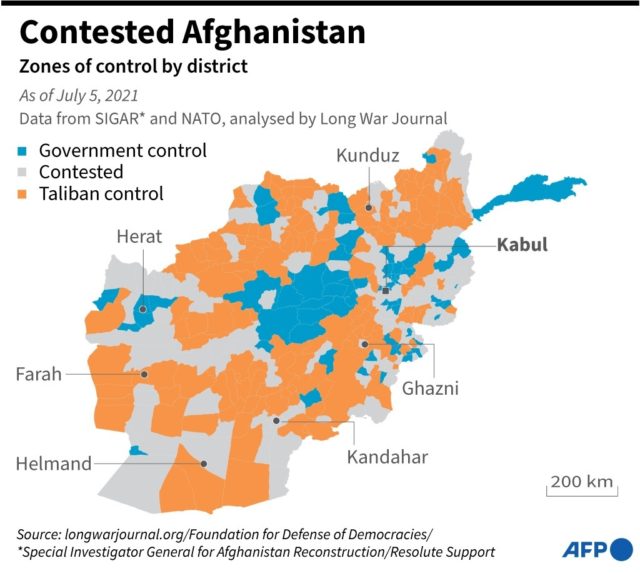More than 1,000 Afghan troops fled into neighbouring Tajikistan on Monday following clashes with the Taliban, as the insurgents gained momentum on the battlefield.
The exodus of troops followed another weekend of fighting across much of the northern countryside where the Taliban have overrun dozens of districts, spurring fears that Afghan forces are in crisis.
As Tajikistan rushed its own troops to “strengthen” the border, Moscow said it had temporarily closed one of its consulates in Afghanistan’s north as the security situation deteriorates.
The Afghan soldiers “did not want to surrender. They had asked for reinforcements but their call was ignored,” said Abdul Basir, a soldier based with a battalion in Badakhshan province that had members flee over the border.
The United States announced Friday that it had handed over Bagram Air Base — the centre of its operations — to Afghan security forces, effectively wrapping up operations in the country following nearly two decades of fighting.
The move curtailed vital air cover from the Americans to the Afghan army.
Tajikistan’s national security committee said that 1,037 Afghan government troops had fled into the ex-Soviet country “to save their lives” after clashes with the Taliban during the night.
“Taking into account the principle of good neighbourliness and adhering to the position of non-interference in the internal affairs of Afghanistan, the military personnel of the Afghan government forces were allowed to enter Tajik territory,” said the statement, published by Tajikistan’s state information agency.
Tajik President Emomali Rakhmon has ordered “the mobilization of 20,000 reserve troops to further strengthen the border between Tajikistan and Afghanistan,” a statement from the presidency said later Monday.
Afghan troops had already crossed into Tajikistan following earlier clashes that saw the Taliban take control of a major border crossing between the countries.
The Afghan government has vowed to launch a counteroffensive in the north.
Hamdullah Mohib, the country’s national security advisor, told Russia’s RIA news agency that an operation was “absolutely” in the works.
On Monday Russia said it had temporarily closed its consulate in the northern city of Mazar-i-Sharif, the capital of Balkh province and one of Afghanistan’s largest urban centers, near to the border with Uzbekistan.
“The situation is changing rapidly. The Afghan forces, as they say, have abandoned too many districts. This logically creates nervousness,” Moscow’s envoy to Afghanistan, Zamir Kabulov told state-run TASS news agency on Monday.
“Many” consulates in Mazar-i-Sharif have “temporarily suspended their activities until the situation becomes clear,” he said. AFP has been unable to confirm reports that Iran and Turkey are among them.
A spokesman at the Russian embassy in Kabul said Moscow had no intention of evacuating the diplomatic mission, however. “The embassy is well defended, its evacuation is not planned,” Nikita Ishchenko told RIA Novosti news agency.
‘Emergency situation’
Already thinly stretched with supply lines strained, Afghan security forces have been crumbling in the face of the Taliban onslaught, with several bases and outposts surrendering to the insurgents without firing a shot.
“Afghan forces have lost their morale,” said analyst Atta Noori in Kabul.
“They are confused — in almost every district that the Taliban capture, they send a team of elders to talk to the soldiers and get them to surrender.”
“It is an emergency situation for the Afghan government. They need to step up their counteroffensive as soon as possible,” he added.
The Taliban pressed on with their offensive across the north over the weekend, seizing most of Badakhshan and Takhar provinces with government forces holding little more than the provincial capitals.
The speed and ease of the Taliban’s effective takeover of the provinces represent a massive psychological blow to the Afghan government.
Both provinces had once served as the strongholds for the anti-Taliban Northern Alliance during the gruesome civil war in the 1990s and were never routed by the militants.
The dire situation in the north was accompanied by reports that the Taliban were also inching closer to the provincial capitals in their southern strongholds of Kandahar and Helmand, with key districts on the outskirts of both cities taken by the group.
“We are so tired of this war. At least today the right thing was done, and one side should take control,” said Shir Mohammad Barekzai, a resident of Helmand’s Nawa district that was seized by the Taliban early Monday.
Since May 1 when the US military began its final withdrawal of about 2,500 troops, Afghan soldiers and the Taliban have clashed fiercely across the rugged countryside as peace talks in Doha stalled.
Despite the Taliban’s rapid gains, the United States has pressed ahead with its withdrawal in accordance with President Joe Biden’s decision to pull all forces from Afghanistan by this year’s 20th anniversary of the September 11 attacks.

COMMENTS
Please let us know if you're having issues with commenting.